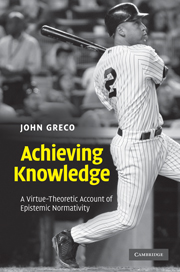11 - The problem of easy knowledge
Published online by Cambridge University Press: 05 June 2012
Summary
Some years ago, G. E. Moore held up one hand and then another, and claimed to have thereby proved that external things exist. Moore's subsequent paper, “Proof of an External World,” has since evoked a variety of responses from philosophers, including bafflement, indignation, and sympathetic reconstruction.
Philosophers have disagreed not only about the success of Moore's alleged proof, but also over what Moore was trying to do in the first place. For example, some have interpreted Moore as an ordinary language philosopher. According to Norman Malcolm, “The essence of Moore's technique of refuting philosophical statements consists in pointing out that these statements go against ordinary language.” Alice Ambrose took a similar view:
It is clear that Moore is in effect insisting on retaining conventions already established in the language about the usage of the words “know” and “believe,” and that the consequence of what he says is the preservation of the linguistic status quo.
As Barry Stroud points out, however, Moore effectively repudiates any such interpretation. In Moore's reply to Ambrose, he says flatly: “I could not have supposed that the fact that I have a hand proved anything as to how the expression ‘external objects’ ought to be used.”
Stroud's interpretation of Moore's proof seems no more plausible, however. According to him, the question as to whether we know anything about the external world can be taken in an internal or an external sense.
- Type
- Chapter
- Information
- Achieving KnowledgeA Virtue-Theoretic Account of Epistemic Normativity, pp. 174 - 196Publisher: Cambridge University PressPrint publication year: 2010



